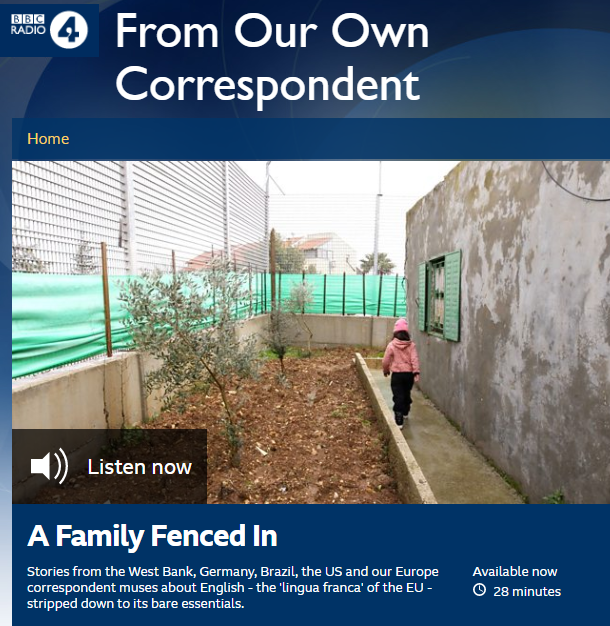As documented earlier this month, a filmed report by Tom Bateman of the BBC’s Jerusalem bureau was published on the BBC News website and aired on the BBC News television channel on February 14th.
BBC’s Tom Bateman tells part of a story about a Palestinian house ‘in a cage’
We noted at the time that:
“In addition to failing to note the second Intifada terror war as the context for the construction of the anti-terrorist fence, Bateman does not bother to clarify that the land on which the ‘settlement’ – Giv’on HaHadasha – was built had been purchased by Jews long before the State of Israel came into being, that it had been the site of a Jordanian army camp after the 1948 Jordanian invasion and subsequent 19-year occupation or that claims by the Gharib family that they owned additional land were shown to be unsupported in several court cases.
Later on in the report Bateman interviews a resident of Giv’on HaHadasha. Pointing at the fence he asks her:
“What do you think when you see a Palestinian home behind all this?”
Ilanit Gohar replies: “He chose this, he chose this type of living” but BBC audiences would be incapable of understanding her reply because Bateman did not bother to inform them that the Gharib family refused an offer of compensation for relocation prior to the construction of the anti-terrorist fence in that area in 2008 and that their claims were rejected by the Supreme Court.”
Just over a week later, on February 22nd, an audio version of Bateman’s report was the lead item in that day’s edition – titled “A Family Fenced In” – of BBC Radio 4’s ‘From Our Own Correspondent’. The synopsis reads:
“President Trump’s plan for peace in Israel and the occupied Palestinian territories would allow Israel to apply its sovereignty to all the Jewish settlements as well as swathes of strategic land in the West Bank. The Palestinian leadership has rejected the plan outright saying it would create a “Swiss cheese state”. Our Middle East Correspondent Tom Bateman spent time on two sides of a fence that separates an Israeli settlement from a Palestinian family with its own checkpoint.”
Presenter Kate Adie similarly introduced the item (from 00:31 here), failing to clarify that the “Palestinian leadership” had rejected the US plan long before they had seen its content. [emphasis in italics in the original, emphasis in bold added]
Adie: “First; President Trump has a plan for peace for Israel and the occupied Palestinian territories. Tensions are high as the American proposals would allow Israel to apply sovereignty to all the Jewish settlements – held as illegal under international law – as well as swathes of strategic land on the West Bank. The Palestinian leadership has rejected the plan outright. Tom Bateman has been on both sides of the fence to take soundings.”
While Bateman may indeed have physically “been on both sides of the fence”, his report makes it very clear which side is the focus of his monologue and with which side listeners are supposed to sympathise.
Providing no context concerning the history of the area – including the highly relevant illegal Jordanian occupation between 1948 and 1967 – Bateman commenced with some very obvious framing of the story which included further repetition of the BBC’s standard partisan mantra concerning the alleged ‘illegality’ of Israeli communities in Judea & Samaria.
Bateman: “Israel captured the West Bank in 1967. Sa’adat Gharib was born over a decade later – a Palestinian boy growing up under Israeli occupation. He watched the territory around him close in. Now he lives in a house surrounded on all sides by a six-meter-high fence with a sliding metal gate. It was installed by the Israeli army, who he says can seal the family into their home at any time. On the map his family’s bungalow appears as a blip, an enclave. On the other side of the wire, an Israeli settlement that grew to dominate the land surrounding Sa’adat’s house.
We drove to see him on the second Friday after President Trump announced his so-called ‘Deal of the Century’. At one checkpoint tyres burned and the smell of tear gas seeped into the car as soldiers confronted a Palestinian protest. Tensions have been rising. The Israelis and Americans have started joint work on a map of all the West Bank settlements ready for Israel to formally annex them. Most of the rest of the world opposes this. The settlements, illegal under international law, thread through the land the Palestinians want as their future country. Their leader calls the Trump plan’s design a Swiss cheese state. Israel’s prime minister says it’s the opportunity of the century.”
Listeners then heard Bateman paraphrasing statements from his interviewee which they later find out he knows not to be true.
Bateman: “On Sa’adat’s driveway the fence rises around us. We look at the homes of the Israeli settlement a few meters away on the other side. He tells me he feels under siege. ‘The settlers confiscated my land’ he says. ‘They haven’t left me air to breathe’. His father built the bungalow in the late 70s. Then, Israel declared the territory around the house state land. Swathes of the West Bank were treated in the same way. Israel adopted an old land law introduced in Palestine in the 19th century. That was when the ruling Ottoman sultan could declare public ownership of any lands he said hadn’t been used to grow crops or keep livestock. Israel used this as a legal basis in the 1980s to claim land for settlements. Sa’adat’s father challenged this at the Israeli courts, claiming ownership of the land around his house. He lost. The judges ruled much of the territory had been bought by Jewish owners in the 1920s.”
Bateman did not bother to inform Radio 4 audiences that the 1858 Ottoman Land Code was also used by the British during their time as administrator of the Mandate for Palestine or that had Israel not used that Ottoman law post-1967, it would be in breach of Article 43 of the 1907 Hague Regulations which refer to “respecting, unless absolutely prevented, the laws in force in the country”.
Failing to inform listeners that the US proposal does not propose uprooting either Palestinian or Israeli residents of Judea & Samaria from their homes (and of course makes no claim of US ‘ownership’ of the land), Bateman went on:
Bateman: “Sa’adat aims to respond to the American plan by staying put. ‘Trump doesn’t own this land’ he says. But the settlers see his home at the edge of the Palestinian village of Beit Ijza as a potential breach in the sprawling separation barrier which cuts through the land here and disconnects the lives of Israelis and Palestinians. The network of walls and fences was built at the height of the Second Intifada – or Palestinian uprising – in the early 2000s and Israel maintains it was and remains essential for its security, to protect Israeli civilians from attack.”
Refraining from clarifying that “attack” actually means Palestinian terrorism and that it is that terrorism which made the checkpoint he later describes necessary, Bateman continued:
Bateman: “The iron meshwork that surrounds Sa’adat’s home contains sensors that alert the army should anyone try to climb the fence and get into the settlement. The police can then monitor the feed from cameras trained on his property. As his children run towards us, I spot a love heart scrawled on his side of the wall. Sa’adat describes the feeling of being under surveillance 24 hours a day. ‘It’s like living in a prison’ he says before adding ‘actually, in a real prison there’s someone to feed you, to take care of you’.
We leave the enclave to go to the settlement. It’s a few meters away and should be a 30-second drive but it takes an hour and a half. We have to head through the city of Ramallah to a military checkpoint on the road to Jerusalem where Sa’adat and most Palestinians may not pass. It’s our only route from the lives of those Palestinians we visited to the Israelis next door.
Ilanit Gohar greets me in the settlement of Givon HaHadasha. The name means new Givon, named after a biblical city whose residents were said to have built the walls of Jerusalem. We walk this side of Sa’adat’s fence, peering through the wire at his house, a few meters – but a world – away. You can feel the impact of the Israeli security all around. A jeep rushes along a military road that tunnels under Sa’adat’s driveway. Israel’s security dominance also forms the core of President Trump’s plan. It says the proposed Palestinian state would be demilitarised while Israel would use blimps, drones and aerial equipment for the so-called early warning station inside Palestine to keep watch.”
In the closing lines of his report it emerged that Bateman also knows of the second court case involving the Gharib family.
Bateman: “Ilanit, a young lawyer and resident of the settlement, keeps walking – perhaps in range of some of the security cameras around Sa’adat’s house. ‘He chose to live like this’ she tells me, referring to an offer of compensation if the family moved. ‘It was ruled this land belongs to Israel and not to him’ said Ilanit. ‘We can’t move him, he won’t move us’ she says as she calls President Trump’s plan a historic breakthrough. Annexation is fabulous she tells me, not only for the residents of this settlement but for all the people of Israel.”
The main question arising from this audio report is if Tom Bateman knew about both the Ghraib family’s failure to prove in court ownership of part of the land they claimed and their later refusal to accept compensation for relocation (with the situation described in all three of his reports being the result), why did he fail to provide that information to BBC audiences who saw the two previous filmed reports and why did he wait over a week to include that information in his radio report for non-international BBC audiences?




